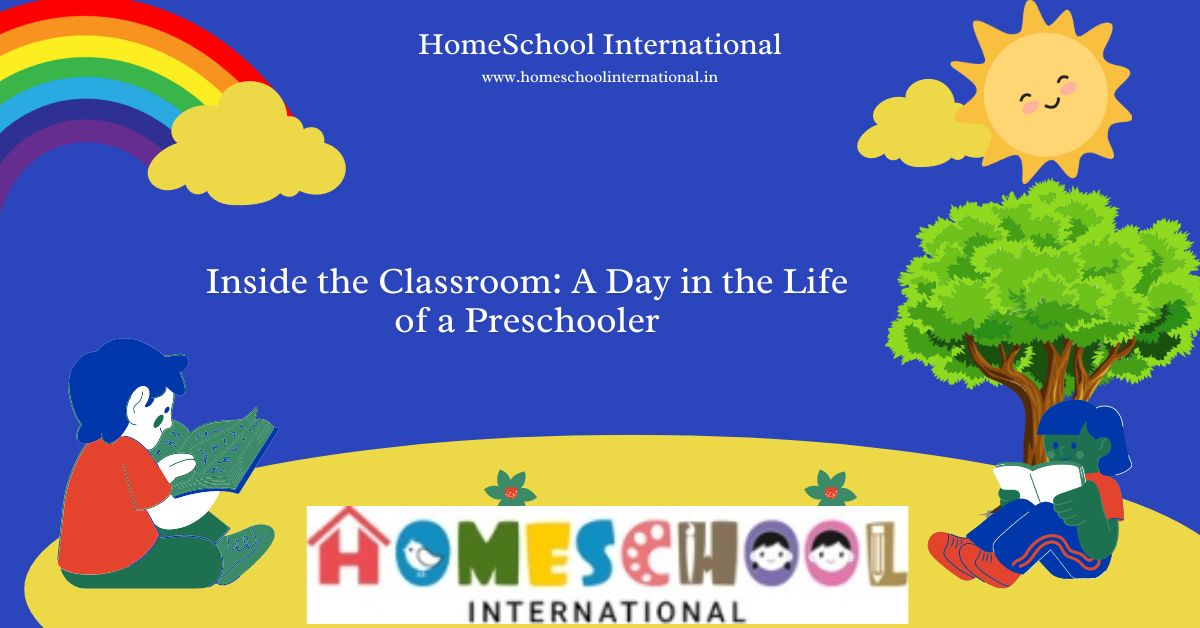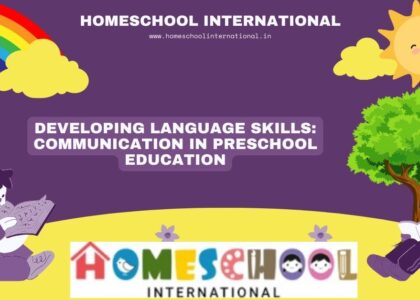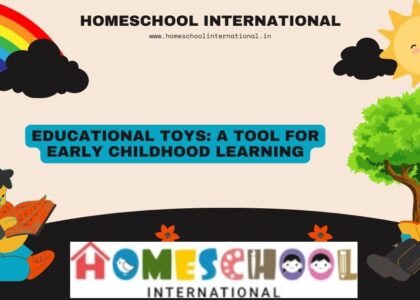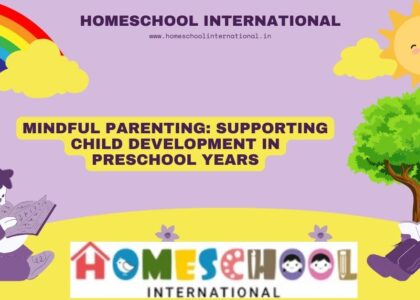Inside the Classroom: A Day in the Life of a Preschooler- Welcome to our exploration of the vibrant world of preschool education! In this blog post, we delve into the captivating journey of a preschooler’s day, shedding light on the enriching experiences and valuable lessons that shape their early years. Join us as we embark on a captivating journey into the “Life of a Preschooler,” where every moment is filled with curiosity, creativity, and boundless potential.
Preschools play a pivotal role in laying the foundation for a child’s future success, nurturing their social, emotional, and cognitive development. Through a lens of wonder and discovery, we invite you to witness firsthand the magic that unfolds inside the classroom, offering insights into the dynamic routines, playful learning activities, and meaningful interactions that define the preschool experience. Let’s dive in and uncover the joys of early childhood education together.
Also Check: Building a Strong Foundation: Benefits of Early Childhood Education
A Peek into Morning Routines
Establishing the Foundation for Learning: As the sun rises and a new day begins, preschoolers eagerly embark on their morning routines, laying the groundwork for a day filled with exploration and discovery. From the moment they enter the classroom, a sense of excitement permeates the air as children prepare to engage in a variety of enriching activities.
Embracing Structure and Consistency: Morning routines provide preschoolers with a sense of structure and consistency, essential elements for their overall development. These routines often include familiar rituals such as greeting friends, hanging up backpacks, and settling into circle time. Through these rituals, children learn the importance of predictability and organization, setting the stage for a successful day of learning ahead.
Fostering Independence and Responsibility: Preschoolers are encouraged to take ownership of their morning routines, fostering independence and responsibility from a young age. Whether it’s selecting a favorite book for story time or choosing a puzzle to work on independently, children are empowered to make choices and take initiative in their learning journey. These small acts of independence build confidence and self-esteem, laying the groundwork for future success in school and beyond.
Cultivating a Positive Start to the Day: Morning routines are not just about completing tasks; they also set the tone for a positive and nurturing learning environment. Teachers greet each child with warmth and encouragement, creating a sense of belonging and security. As preschoolers engage in morning activities, they experience a sense of joy and excitement, eager to explore the wonders of the world around them.
Exploring Learning Through Play
Unleashing the Power of Play: At the heart of preschool education lies the transformative power of play. Play is not just a pastime for young children; it’s a crucial mechanism for learning and development. In the preschool classroom, play takes center stage as children engage in a diverse array of hands-on activities designed to spark their curiosity and ignite their imaginations.
Diving into Imaginative Worlds: From building towering block structures to exploring sensory bins filled with various textures and materials, preschoolers immerse themselves in imaginative worlds where anything is possible. Through play, children develop essential skills such as problem-solving, creativity, and critical thinking, laying the foundation for future academic success.
Learning Through Exploration and Discovery: Preschoolers are natural explorers, eager to investigate the world around them. Whether it’s conducting experiments in the science corner or observing insects in the outdoor garden, children learn best when they are actively engaged in hands-on experiences. These exploratory activities not only deepen their understanding of core concepts but also foster a sense of wonder and curiosity that lasts a lifetime.
Nurturing Social Skills Through Play: Play provides invaluable opportunities for preschoolers to develop crucial social skills such as communication, cooperation, and empathy. As children collaborate on projects, take turns in games, and navigate conflicts, they learn to navigate the complexities of social interactions in a supportive and nurturing environment. These early experiences lay the groundwork for positive relationships and effective communication skills in the years to come.
Also Check: Choosing the Right Preschool: Factors to Consider for Parents
Nurturing Curiosity and Creativity
Cultivating a Love for Learning: Preschools are bustling hubs of creativity and discovery, where every corner invites children to explore, imagine, and create. Through a myriad of hands-on activities and open-ended projects, educators nurture a love for learning that extends far beyond the classroom walls. Whether it’s painting masterpieces in the art corner or constructing elaborate structures in the block area, preschoolers delight in the opportunity to express themselves and unleash their boundless creativity.
Encouraging Curiosity and Inquiry: Curiosity is the driving force behind learning, and preschools are dedicated to fostering this innate sense of wonder in every child. Teachers encourage children to ask questions, seek answers, and explore the world around them with curiosity and enthusiasm. Through guided inquiry-based activities, preschoolers develop critical thinking skills and a thirst for knowledge that will serve them well throughout their academic journey.
Embracing Mistakes as Opportunities: In the preschool classroom, mistakes are not frowned upon; they are celebrated as valuable learning opportunities. Children are encouraged to take risks, experiment with new ideas, and learn from their experiences, fostering a growth mindset that sets the stage for future success. Whether it’s building resilience through a failed block tower or problem-solving through a challenging puzzle, preschoolers learn that setbacks are simply stepping stones on the path to mastery.
Fostering a Sense of Ownership and Pride: Preschoolers take great pride in their accomplishments, no matter how small. Whether it’s proudly displaying a piece of artwork or sharing a newfound discovery with their classmates, children develop a sense of ownership and agency in their learning journey. Through praise and encouragement, educators empower children to take pride in their achievements and strive for excellence in everything they do.
Building Social Skills and Relationships
Fostering Connections in the Classroom: In the dynamic world of preschool education, fostering social skills and building relationships is paramount. Preschool classrooms serve as vibrant communities where children learn to navigate social interactions, communicate effectively, and develop meaningful connections with their peers. Through a variety of collaborative activities and group projects, educators create opportunities for children to forge lasting friendships and cultivate empathy and understanding.
Learning Through Collaboration and Cooperation: Collaboration is at the heart of the preschool experience, as children work together to achieve common goals and solve problems as a team. Whether it’s building a fort in the dramatic play area or participating in a group art project, children learn valuable lessons in cooperation, compromise, and communication. These collaborative experiences not only strengthen social bonds but also lay the foundation for effective teamwork and collaboration in future endeavors.
Nurturing Empathy and Understanding: Preschools play a crucial role in nurturing empathy and understanding in young children, helping them develop compassion and respect for others. Through discussions about feelings, role-playing scenarios, and learning about diverse cultures and perspectives, children learn to appreciate differences and embrace the unique qualities that make each individual special. These experiences foster a sense of empathy and understanding that extends far beyond the classroom, shaping children into compassionate and caring members of society.
Encouraging Positive Communication Skills: Effective communication is a cornerstone of preschool education, as children learn to express their thoughts, feelings, and ideas in a clear and respectful manner. Teachers model positive communication skills and provide opportunities for children to practice active listening, turn-taking, and expressing themselves verbally and non-verbally. Through meaningful interactions with their peers and educators, children develop the confidence and competence to communicate effectively in any situation.
Also Check: The Importance of Early Learning: A Guide to Preschool Education
Afternoon Adventures and Reflections
Engaging in Enriching Afternoon Activities: As the day progresses, preschoolers embark on a new set of adventures in the afternoon, filled with opportunities for exploration, creativity, and reflection. After a morning of active learning and social interaction, children transition to quieter, more introspective activities that encourage self-discovery and expression. From quiet reading corners to sensory exploration stations, preschoolers have the freedom to choose activities that speak to their interests and passions.
Embracing Moments of Quiet Reflection: Afternoon activities provide preschoolers with valuable opportunities for quiet reflection and self-expression. Whether it’s journaling about their day, creating art inspired by their experiences, or simply sitting quietly and observing the world around them, children learn to tune into their thoughts and emotions and express themselves in meaningful ways. These moments of reflection promote mindfulness and self-awareness, nurturing children’s emotional intelligence and resilience.
Celebrating Achievements and Milestones: As the day draws to a close, preschoolers come together to celebrate their achievements and milestones. Whether it’s completing a challenging puzzle, mastering a new skill, or making a new friend, children take pride in their accomplishments and share their joy with their classmates and teachers. Through praise and encouragement, educators reinforce children’s confidence and self-esteem, fostering a positive sense of identity and belonging.
Cultivating a Sense of Gratitude and Appreciation: In the hustle and bustle of daily life, it’s important to take a moment to pause and express gratitude for the blessings and opportunities that surround us. Preschools teach children the importance of gratitude and appreciation through simple acts of kindness, such as saying thank you, sharing with others, and expressing appreciation for the beauty of the world around them. These small gestures of gratitude cultivate a sense of humility and empathy, fostering strong connections with others and a deep appreciation for life’s blessings.
Conclusion: Inside the Classroom- A Day in the Life of a Preschooler
As we come to the end of our exploration into the “Life of a Preschooler,” we’re reminded of the incredible journey that young children embark upon each day. From the moment they step into the classroom to the quiet moments of reflection in the afternoon, preschoolers are immersed in a world of wonder, curiosity, and boundless potential. Through meaningful interactions with their peers and educators, hands-on learning experiences, and opportunities for self-expression, children grow and thrive in ways that shape their future success.
Preschool education plays a crucial role in laying the foundation for a child’s lifelong learning journey. By fostering social, emotional, and cognitive development in the early years, preschools set children on a path to success in school and beyond. From building friendships and developing communication skills to exploring the wonders of the world around them, preschoolers are equipped with the tools they need to navigate life’s challenges and embrace its joys.
As we look toward the future, it’s clear that the impact of quality early education extends far beyond the walls of the classroom. By investing in the next generation of learners, we’re not just shaping individual lives; we’re building a brighter, more compassionate future for us all. Together, let’s continue to champion the importance of early childhood education and ensure that every child has the opportunity to thrive and succeed.
We invite you to join us on this journey of discovery and learning, as we continue to explore the wonders of early childhood education. Whether you’re a parent, educator, or advocate for children’s rights, your support and commitment to quality early education make a difference in the lives of children around the world. Together, let’s celebrate the magic of preschool education and empower every child to reach their full potential.











